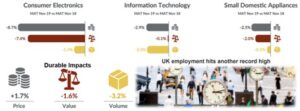Understandably, UK consumers are unsure of the impact Brexit will have on their lives. Consumer behavior is an area that deals with the various stages a consumer goes through before purchasing quality products or services for their end-users. It can also include group configurations and operations related to the purchase, consumption, and sale of products, ideas, schedules, and services.
Post-Brexit changes in import regulations will make some groceries more expensive in local stores and some will disappear from the shelves. Consumers may not be willing to make new food choices, as there are fewer options available at the grocery store for those who are more comfortable buying the same things every week.
Research by the Competition and Consumer Protection Commission, which surveyed 1,000 adults in Ireland, found that 40% of shoppers who bought from a UK retailer had returned items. When asked about the reason for returning, 55% of respondents said they returned a purchase because the product did not meet their needs, and 16% said they had changed their mind.

Over the years, a maximum proportion of consumers can make their purchase decisions entirely through the information that is processed mainly through the Internet. In addition to usability, performance and speed are also becoming more and more important. Consumer behavior changes due to technology.
Consumer confidence is an economic indicator that measures the optimism that consumers have about the general economic and financial situation of a country. When consumer confidence deteriorates, consumers lose confidence in their financial planning and spend less; This, in turn, affects businesses as they begin to see a decline in sales. Hence it becomes necessary for businesses to seek the guidance of a market research expert in the UK to understand the consumers’ buying behaviour. Please visit http://businessplandesk.com/ to know more about our marketing and other business-related service offerings.
Learning refers to the method by which consumers change their behavior after receiving or finding information. That’s why consumers don’t buy a terrible item twice. Learning doesn’t affect what consumers buy; it affects the way they shop. People with limited experience with a product or brand generally seek more information than people who have already used a product. Here we get a picture of a UK population that is approaching Brexit with a steady but careful mindset, where consumers will continue the now established habit of shopping around (whether daily or special treats) for the best deals.
Leave a Reply